1989 and donkeys in Baku – Visa decision day in Brussels – ESI in Harvard
 |
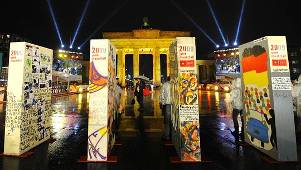 |
|
Celebrations in Berlin 1989 – and 2009 |
|
Dear friends of ESI,
Twenty years ago an amazing year of protests and negotiations gave birth to the (largely) undivided Europe of today.
1989 was a reminder never to underestimate the "significance of things being done by little people in little countries". It was the year in which the world was changed not by what great powers did, but by what they did not do. It was also the demonstration of the power of simple ideas: "return to Europe" as a continental vision of democratization; "living in truth", as courageous people challenged the lies of an outworn authoritarian ideology.
The non-violent revolutions of 1989 were the result of huge crowds driven "by a desire to be normal". One aspect of this normality is the ability to openly criticize authorities. Another is the freedom to travel, to end the confinement put in place with the advent of communism. It is a normality that remains elusive in parts of the continent even today.
While Europe celebrated the anniversary of the fall of the Wall on 9 November 2009 in Berlin, authorities in Baku, as if to mock the celebratory mood elsewhere on the continent, sentenced the pro-democracy activists Emin Milli (30) and Adnan Hajizada (26), who had been critical of the government, to prison (two years and two years and six months, respectively) for "hooliganism".
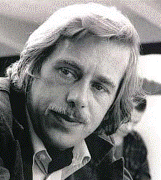 |
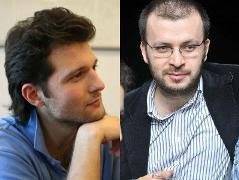 |
|
The young Vaclav Havel |
Adnan and Emin |
Democrats in Baku are proud to point out that there is in fact a legacy on which to build a European Azerbaijan: in 1918 the country became the first secular democracy in the Muslim world only to be invaded by the Red Army in 1920. In 1991 an independent and democratic Azerbaijan was restored and in January 2001 Azerbaijan joined the Council of Europe.
Since 1999, however, as oil revenues rose dramatically, respect for basic human rights has deteriorated. Journalists were jailed, civil liberties curtailed, and there are once again political prisoners.
Like other journalists in Azerbaijan, Emin Milli and Adnan Hajizada were sentenced for "hooliganism", after having been attacked themselves in a restaurant in the centre of Baku. Both had studied abroad. Both shared a dream with a new generation of young Azerbaijanis that their country could live up to democratic ideals. Like their predecessors in communist Central Europe, Emin and Adnan did not seek to become dissidents. But, as Vaclav Havel noted in his famous essay on "the power of the powerless", written in 1978:
"a dissident is simply a physicist, a sociologist, a worker, a poet, individuals who are doing what they feel they must and, consequently, who find themselves in open conflict with the regime. This conflict has not come about through any conscious intention on their part, but simply through the inner logic of their thinking … they do not usually discover they are dissidents until long after they have actually become one."
Emin and Adnan were not radicals by any means: in fact, they worked together with the Azerbaijani government on a campaign called "The Future Is What You Do Now" to allow talented Azerbaijanis to study abroad. But they did not stay silent as the regime became more authoritarian.
On 9 February 2009, Emin and a group of fellow youth activists protested in front of the UN headquarters in New York against a referendum abolishing presidential term limits. In April 2009 Emin gave a presentation at the Harriman Institute at Columbia University on "Dynasty and Democracy in Azerbaijan" where he criticized the system of corruption in his country, and the fact that President Ilham Aliyev was "even less of a democrat" than his father. He also presented a Manifesto for Change in Azerbaijan, arguing for gradual change, not revolution.
 |
|
Donkey press conference in Baku |
In June 2009 Adnan and his colleagues protested against corruption in Azerbaijan and against plans for a new restrictive law on NGOs by posting a clip of a donkey holding a press conference in Baku on Youtube.
This satirical take on politics in Baku seems to have crossed the red line. A few weeks later Emin and Adnan were attacked in a restaurant in the centre of Baku. Then, when they went to the police station, they were arrested themselves.
The fall of the Berlin Wall, the story of Polish dissent, the prison writings of Vaclav Havel and the story of Charter 77 in Czechoslovakia are all today part of the legend how a new era in European history came about. In Azerbaijan this new era is still to begin.
Balkan Visa Decision Day – 30 November
The European Parliament marked the anniversary of 1989 with a debate of 20-year olds from across the EU on "What Europe means to me?". Most participants noted first and foremost the "freedom to travel."
How appropriate then for the European Parliament to call on the EU on 12 November 2009 to finally bring down another wall, established almost twenty years ago for the people of the Balkans. The European Parliament adopted its opinion of the Commission's visa liberalisation proposal of 15 July with 550 votes in favour, 51 against and 37 abstentions. The Parliament requested that the Commission starts a visa dialogue with Kosovo and establishes a roadmap for visa liberalisation for Kosovo similar to those established with the other Western Balkan countries; and that Bosnia and Herzegovina and Albania are moved to the "white list" (together with Macedonia, Serbia and Montenegro), with asteriks stipulating that visa-free travel will become applicable the moment they meet all outstanding conditions. This could now happen already in the first half of 2010.
ESI started a campaign to achieve a roadmap for Kosovo in July 2009. ESI also asked for an asteriks solution for Bosnia and Albania as early as 1 June 2009 in a letter sent to the relevant EU and national decision-makers.
Like ESI, the Parliament also stresses that Bosnia and Herzegovina and Albania have made real progress with regard to the visa roadmap since the May 2009 Commission assessments (for an updated Score-card on Albania's progress please go here).
EU member states will vote on the Commission's visa proposal on 30 November 2009. If they follow the suggestions by the European Parliament, this day will be one of the most important in the recent history of relations between the EU and the Western Balkans. This is the most meaningful way to honour the legacy of 1989.
Citizens of Kosovo will also follow the deliberations of the EU member states with great interest. As a new ESI discussion paper Isolating Kosovo? (supported by Erste Stiftung) points out, today Kosovo citizens are more isolated in terms of visa requirements, than at any point in the last half-century. Holders of the new Kosovo passport can travel to only 5 countries visa free: neighbouring Albania, Montenegro and Macedonia, Turkey, and Haiti. Even citizens of Afghanistan can travel to 22 countries without a visa.
This, as the European Parliament points out, makes no sense. It is certainly not justified by reference to Kosovo's unresolved status (there are still five EU member states which do not recognize Kosovo's independence): at this very moment, a serious visa dialogue between the European Commission and the Republic of Taiwan is under way. Taiwan has not been recognized by a single EU member state.
Recent experience shows that wherever a clear roadmap process has been in place, the EU's soft power has increased significantly. If the EU is interested in institutional capacity building in Kosovo, and already finances the largest rule of law mission in EU history, it makes no sense at all not to employ the strongest possible conditionality.
So what is to be done? The answer is easy and to be found in the European Parliament report:
"… The Commission, within the limits of its competence and in the light of UN Security Council Resolution 1244 (1999), should start a visa dialogue with Kosovo with a view to establishing a roadmap for visa facilitation and liberalisation similar to those established with Western Balkan countries."
ESI has published more than 20 reports on Bosnia since 1999. Recently, however, a publication by another institution summed up perfectly our own findings: the latest ICG paper, published on 12 November. ICG makes five points concerning Bosnia in its conclusion, all of which we fully support, and which would prevent Bosnia from falling behind other Balkan countries on the way to EU candidate status in 2010:
"Bosnia has made remarkable progress since the war."
"Popular anxieties notwithstanding, the country is not at risk of armed conflict; as its widely respected Bosniak defence minister recently pointed out, "There is no capacity to provoke a war, or fuel to sustain [a war], either in Bosnia and Herzegovina or in our neighbourhood."
"The conflict over the future of the OHR should end now; the office should close and be replaced by a reinforced EUSR. A strengthened EUSR, backed by incentives of eventual EU and NATO integration, is better placed to deliver whatever may be missing in BiH's constitutional and governance jigsaw."
"BiH's legitimacy and stability do not rest on a foundation of patriotism or common identity but instead on a community of interest, reinforced by the absence of viable alternatives and a common fear of violent disintegration. RS's Serbs may resent the state, but BiH's long-term stagnation would eventually damage their fortunes too. Independence is not an option for the Serbs: it would mean isolation and a dramatic loss of their status and influence."
"Bosnia's disputes will only be resolved over time, as the state's growing ability to govern, represent its citizens and deliver services – starting with visa-free travel throughout Europe – strengthens its appeal."
Read the whole report! For more on Bosnia see also ESI's Bosnia reports.
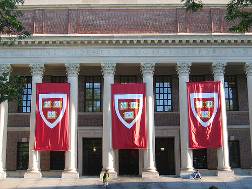 |
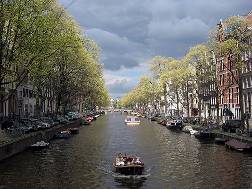 |
ESI at Harvard – in Amsterdam – and in Madrid, Halifax, London, Istanbul …
In September 2009 your Rumeli Observer relocated to Cambridge (USA), as fellow of the Carr Center for Hurman Rights Policy at the Harvard Kennedy School of Government. There we will now create a regular Balkan-Turkey-Caucasus Round Table. If you are interested in discussing and influencing change in South East Europe and if you are in the Boston area, please write to either Gerald Knaus or Jelena Sesar.
This week ESI also organised the 8th workshop on enlargement debates in Europe. After Vienna, Berlin, Paris, Rome, Prague, Warsaw and Stockholm we went to Amsterdam. As we did for all these events, we also produced a detailed manual of who is who in the Dutch enlargement debate, one of the most interesting in Europe. We hope you find it useful. For information on different national enlargement debates please visit the ESI enlargement website section.
In recent weeks ESI analysts presented our research in Madrid, Budva, Brussels, Berlin, Cambridge, London, Tirana, Lisbon, Halifax, Istanbul, Yale and Princeton. To learn when we do presentations near you, please check the ESI news page for announcements.
Best regards and Happy Thanksgiving,

Gerald Knaus
- ESI discussion paper: Isolating Kosovo? Kosovo vs Afghanistan 5:22 (19 November 2009)
- ESI-EMA: Albania Visa Score Card (16 November 2009)
- ESI manual: The Dutch EU enlargement debate. Information and contacts (November 2009)
- ICG report: Bosnia's dual crisis (12 November 2009)
- Rumeli Observer on Azerbaijan, Russia, Sweden, Turkey and enlargement
